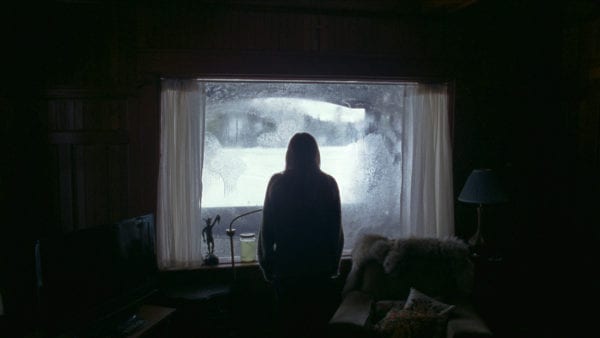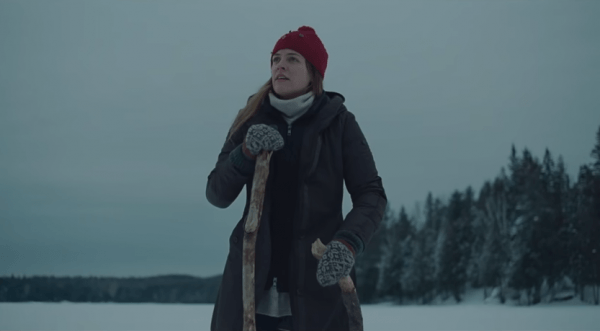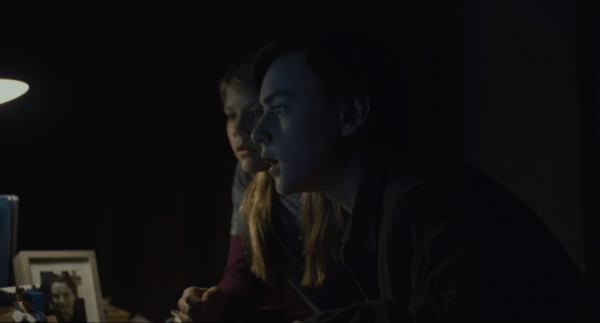The Lodge, 2019.
Directed by Severin Fiala and Veronika Franz.
Starring Riley Keough, Jaeden Martell, Lia McHugh, Richard Armitage, Alicia Silverstone, Danny Keough.

SYNOPSIS:
At a remote holiday home, a stepmother to-be gets snowed in with her fiancé’s two children. A relationship that begins as more than a little frosty, eventually starts to thaw. But, in their isolation, strange and terrifying events start to take place.

As film settings go, few open the door for all manner of fear quite as widely as the cabin in the woods. To the dismay of Airbnb owners everywhere — from mountain huts in Colorado to Hobbit houses on the Isle of Skye — the idea of the remote weekend away has become synonymous with terror. Thanks to the horror genre, off the grid is very much off the list.
The Lodge does very little to change that. With a spec script penned by Sergio Casci, Severin Fiala and Veronika Franz (the directing duo behind creepy Austrian horror Goodnight Mommy) set the familiar foundations for the archetypal cabin in the woods story, but furnish it with an intriguing, unnerving study of grief, trauma and religion.
Just as it was in their 2014 feature debut, the foundations for The Lodge are built on a family in the heat of dysfunctionality. Before the degrees fall and the chills of the movie’s snowy setting begin to set in, father Richard (Armitage) tells his estranged wife Laura (Silverstone) he wants a divorce and informs her of his intentions to marry new girlfriend Grace (Keough) — a revelation that prompts Laura to calmly return home and do something she can never take back.
In the aftermath, Richard reveals his wedding plans to his two children, Aiden (the It series’ Jaeden Martell) and Mia (McHugh), and invites them on a trip to the titular holiday home for Christmas in the hope they will finally bond with Grace. Things start out more than a little frosty, however, with the kids silently shooting disapproving gazes Grace’s way, while she tries desperately to conceal the lingering pain of a past trauma. Quickly invoking the same dreary atmosphere of Goodnight Mommy, the film’s restraint — one of few characters and even fewer locations — mean that less is very much more. In the eerily picturesque wintery setting, the terrifying allure of The Lodge, at least at first, lies almost exclusively in what is not said.
And, just like untouched snow, this is an experience best had unspoiled. That said, it should hardly come as a surprise to anyone that, as the weather worsens and the phone battery plummets, strange and sinister events start to occur. Paranoia slowly creeps in as the stranded, shivering central trio stagger in and out of likeability. Accompanied by the sharp, scratchy notes of Danny Bensi and Saunder Jurriaans’ striking score, within the four walls of the creaky wooden structure, belongings start to go missing, religious iconography begins to emit an ominous aura and voyeuristic urges take hold. With tensions mounting up, it isn’t long before we are pulled into a darkly ambiguous tale of distrust, where audience allegiance is yanked in every direction as the source of evil becomes increasingly difficult to nail down.
In the end, the film’s refusal to let events boldly simmer away in inconclusive shades of grey come the credits is ultimately its downfall. Things abruptly revert to definitive strokes of black and white during the film’s frantic finale, quickly melting away the solid narrative blocks so competently moulded together in the build up. As a result, The Lodge disappointingly succumbs to the promise of its own title by falling back on lazy genre tropes that deal in psychological assessments of the most feeble kind. In an era of heightened awareness around mental health, that all feels more than a little regressive.
Flickering Myth Rating – Film: ★ ★ ★ / Movie: ★ ★ ★
George Nash is a freelance film journalist. Follow him on Twitter via @_Whatsthemotive for movie musings, puns and cereal chatter.












